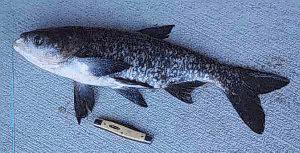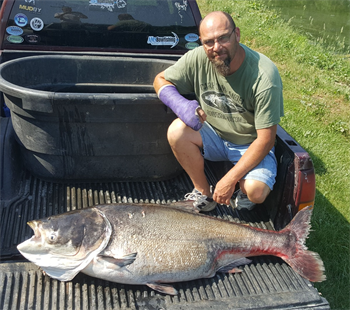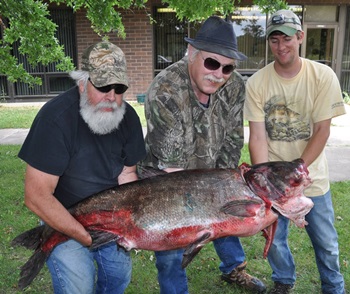Fish Iowa - Fish Species - Bighead Carp

Characteristics
Large, heavy-bodied fish that can grow to about 60 inches and 110 pounds. The back and upper sides of the body are dark gray fading to off-white on the lower sides and belly. There are many dark irregularly-shaped blotches scattered over the whole body. The scales are very small, like trout scales. Bighead Carp have very large heads with eyes located far forward and projecting downward. The large mouths have a protruding lower jaw and no teeth.
Foods
- No results found
Expert Tip
- No results found
Details
The Bighead Carp is a plankton eater (microscopic algae) native to Asia. It was originally introduced in Arkansas in 1972. By 1982, it was in the Missouri sections of the Mississippi and Missouri Rivers where it is now widely distributed and well established. The Bighead Carp was first recorded in Iowa in the late 1990’s. Found in both the Missouri and Mississippi Rivers, it has also been documented in the Big Sioux River, the Cedar River, the Des Moines River below Red Rock dam, the Iowa River below Coralville Dam, and considered to be numerous in the Chariton River below Rathbun dam.
The Bighead Carp comes from the big rivers of China (Yangtze and Huang Ho) so it has adapted well to the Mississippi and Missouri Rivers. Using gill rakers to filter plankton and detritus, the Bighead Carp can easily adapt to many environments. Both young and adults prefer the lower reaches of tributary streams and overflow waters in the river floodplain. Large groups of Bighead Carp have been seen in the tailwaters of several impoundments.
Netting studies in the Mississippi River conducted by the Illinois DNR have found that bigheads school with paddlefish and may compete with them for food. Since bighead eat microscopic food, it is feared they will also compete with young larval native fish for food. They can get very large; individuals over 60 pounds have been collected.
Recent stream sampling information is available from Iowa DNR's biological monitoring and assessment program.
Sources:
Loan-Wilsey, A. K., C. L. Pierce, K. L. Kane, P. D. Brown and R. L. McNeely. 2005. The Iowa Aquatic Gap Analysis Project Final Report. Iowa Cooperative Fish and Wildlife Research Unit, Iowa State University, Ames.
Distribution Map

Bighead Carp are native to large rivers of southern and central China. An Arkansas fish farmer first brought them to the United States in 1972 to improve water clarity and increase fish production in culture ponds. Bighead Carp started to appear in the wild (Mississippi and Ohio Rivers) in the early 1980’s, likely escaping from aquaculture facilities. They quickly spread to other rivers in the Mississippi River Basin and have been recorded from within or along the borders of at least 18 states.
See our most recent distribution data for this species on the Iowa DNR's Bionet application.
State Record(s)
Master Angler Catches
Fish Surveys
Tip: Click Species Length by Site, then use the dropdown to filter by fish species of interest.Where this Fish Is Found
Big Sioux River
Cedar River (Cedar Rapids to Moscow)
Cedar River (Moscow to Columbus Junction)
Des Moines River (Farmington to Keokuk)
Iowa River (Coralville Lake to River Junction)
Little Sioux River (state line to Linn Grove)
Missouri River (Council Bluffs to state line)
Missouri River (Little Sioux to Council Bluffs)
Missouri River (Sioux City to Little Sioux)
Pool 16, Mississippi River
Pool 18, Mississippi River
Pool 19, Mississippi River
Spirit Lake

